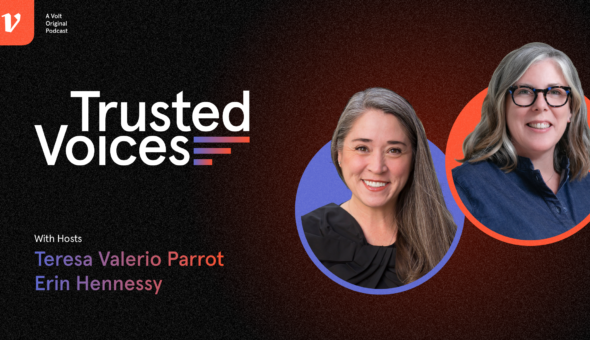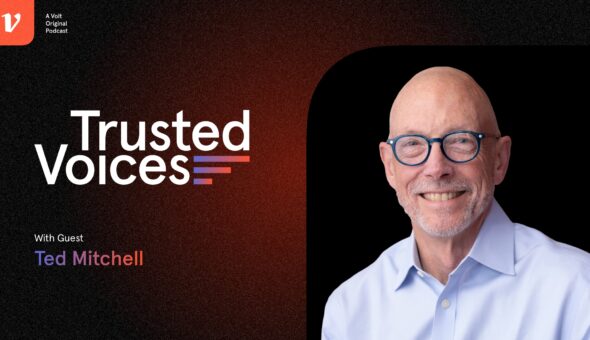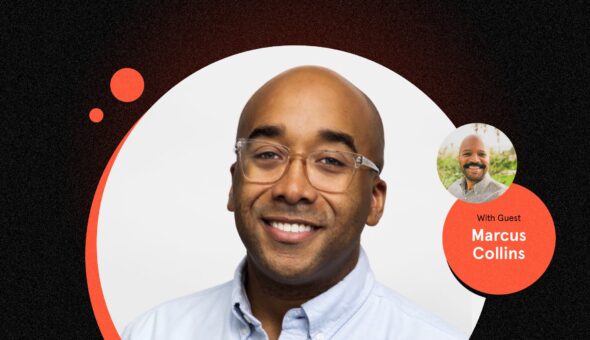Read the full transcript here
Kevin Tyler:
“Social media is not a megaphone for brands to amplify their own messages. Users expect more and the bar is now higher.”
Jenny Li Fowler’s new book, “Organic Social Media, How to Build Flourishing Online Communities,” is filled with gorgeous, substantive, thoughtful statements like that. I’m so excited to welcome my friend of years, Jenny Li Fowler, to Higher Voltage. Jenny Li Fowler is the Director of Social Media Strategy at MIT. She’s in charge of developing and executing institution-wide social media initiatives and campaigns and provides social media consultation and direction for more than 200 departments, labs and centers. She also leads the Social Media Working Group, which has 160 members. And prior to joining MIT, Jenny was the web editor and social media manager at Harvard Kennedy School. But most importantly, she’s my buddy, Jenny Li Fowler. It’s so great to see you. Thank you for joining us today.
Jenny Li Fowler:
I am delighted, delighted to be here. So excited.
Kevin Tyler:
Was there anything in your intro that you want people to know before we dive into this incredible conversation that I did not mention?
Jenny Li Fowler:
Oh, no, you did… You did… That was great.
Kevin Tyler:
Well, thank you. There are so many things I want to ask you about this book. The first, I think, place to start would be, what’s this book’s origin story? Why is this coming out right now?
Jenny Li Fowler:
You’re going to laugh, actually. There are people that are acquisition editors. Did you know this? I didn’t know this was a thing. These editors go and acquire people basically and say, do you want to read a book? There’s this woman that ended up in my inbox one day and she just said, have you ever thought about writing a book?
I thought it was a joke. I told my husband, I said, this random woman emailed me and is asking me if I wanna, about a book and possibly, I said, I bet she’s gonna ask me if I have 10,000, if you have $10,000, we’ll publish your book for you. And so several conversations later, it turned out not to be a joke, it turned out to be serious. And I think, one, you know, one reason why I couldn’t, I mean, you can’t, you can’t turn that down, right? I, it was this opportunity of a lifetime, but also, you know, it was, I was very aware of the fact that if I said no, Kevin, the next person that they ask might be a white man and representation is so important to me. And I want young women and, you know, young women of color to see that I’m doing this job for, you know, a very globally known institution. And that was super important to me.
Kevin Tyler:
Ugh.
Jenny Li Fowler:
And so I told my husband, I can’t not write this book, even my daughter, […], was like, you can’t not do this. And so here we are.
Kevin Tyler:
Ooh, you better speak on it. I love, that’s the best reason in the world. You’re exactly right. If not you…
Jenny Li Fowler:
Oh, thank you.
Kevin Tyler:
There you go. And I’m so glad that is one of the reasons why you wrote this. First of all, you have a lot of information to share.
Jenny Li Fowler:
Oh, thank you.
Kevin Tyler:
You are so good at what you do that this is like the only, like it makes perfect sense that you would have a book. Like it just makes perfect sense.
Jenny Li Fowler:
I appreciate that.
Kevin Tyler:
And the way that this is written, the way that it is organized, it’s not scary. It’s very accessible. It’s very conversational. It’s not like… It’s a great read. And if you’re in social media, this is a book that you should have on your shelf. Um, what effect before we get into the details of the book, because there are many, what effect do you hope this book has on higher education marketing? Cause this is about more than just social media.
Jenny Li Fowler:
And okay, I just want you to know that the way that you are describing this is just blowing me away. I am so humbled. But I guess when my goal, my first and foremost goal was to help new social media managers, you know, just really hit the ground running. I wanted them to get to where I am faster than how I got here, right? I made all the mistakes. So I want you, I want you to learn from them or learn from my experience.
Kevin Tyler:
Jenny walked, so y’all could run.
Jenny Li Fowler:
And yeah, yes. Oh my gosh. I just, oh my gosh. Um, uh, so, you know, I’m really rooting for social media managers out there. And I really wanted institutions to, hopefully, really take a look at the position and elevate the position, you know, give it the respect that it’s due. We, you know, social media is a quarter of a century old now and it’s not a nascent industry. It’s a very specific and sophisticated industry and we should treat those that are doing it as professionals with respect.
Kevin Tyler:
Yeah, like professionals.
Jenny Li Fowler:
Yes.
Kevin Tyler:
This idea, like I’m, I am shocked at some of the ways that higher ed specifically still views social media. It’s like, oh, we have an intern who’s 20. They… just have them do it. And it’s so much bigger than that. Yes, they should have a, they should contribute. Yes, I think there are ways for interns to contribute to social media, but it is, it should not be forgotten. It’s not the last thing on the totem pole. It is an active part of a marketing plan. It is part of your business model. It is part of how you message and to relegate it to like, just give it to the youngest person is…
Jenny Li Fowler:
Because they know how to use the platform, maybe? Yeah, it’s antiquated thinking. There’s no front door to your brand or institution anymore. And the way a lot of people are experiencing your organization or brand is online and on the internet. It takes nuance and experience and good judgment to respond to how quickly social media moves and reacts. It’s not just a marketing plan, but there are lots of crisis and crises that unfold on social media.
You don’t want your niece, you know, you have like, you have a lot of people say, you know, my niece had this suggestion for our social media strategy. You don’t want your niece to be in front of the camera giving out like a crisis media statement. Right. So why would you? Yeah.
Kevin Tyler:
That’s exactly right. And I think that role requires such fluency in so many things. Yes, you have to know how the platforms work and how like how to do the function of social media, but you also have to be aware of, not even more than aware of, you have to be fluent in, that’s the word that’s come to my mind, in the trends, the cultural moments, the holidays, the wars, the all, there are so many things that you have to absorb in order to navigate and create a special community that is either responsive or nimble enough, I guess, to either respond or not respond to what’s going on in the world. And you have to understand what is going on. You have to.
Jenny Li Fowler:
Completely, you are constantly having to read the room. I mean, the internet, I say this in my book, but you know, the internet is a really fickle place and its mood changes in a matter of a snap of the finger, really, you know, and something you might have said two hours ago will be totally tone deaf two hours later. So it’s really important to just recognize everyone’s perspective, know where the lay of the land in the moment, and your own voice and tone. And you wanna stay consistent with how you respond to different situations or celebrations. It should be always consistent.
Kevin Tyler:
When we think about how social media functions in higher ed, it always feels like there’s this hesitancy for institutions to adopt best practices. And I’m curious what you think that’s about. Is it just one more thing that… is it just forgotten? Do people not care? Like, what is it that keeps institutions from doing what we all know is right when it comes to social media?
Jenny Li Fowler:
Kevin, that is a million dollar question. That’s a complex, there’s many layers to this, right? I think part of it still is generational. I don’t want to make sweeping generalizations because that’s sort of not fair, but I think a lot of it has to do with that. There are people that have been in positions for a very long time and your pamphlet and brochure strategy does not work for social media, but when you’re not willing to, I don’t know, like learn or listen to folks that happen to be experts in that area, you just end up maybe making the same mistakes or doing the same thing over and over again.
Kevin Tyler:
…or looking at what other schools are doing and that’s not best practice either.
Jenny Li Fowler:
Right, exactly, exactly. We do tend to do that in higher ed a lot. Notice how a lot of our websites look exactly the same. And I always, I’m like, why is there a formula? I don’t think we have to buy into these templates too much.
Kevin Tyler:
Exactly.
Jenny Li Fowler:
But yeah, that’s a great question. I think there are lots of layers to it. It’s not so simple, but there’s a lot of work to be undone, I think. There are a lot of job descriptions that are so old and they probably don’t even have social media in them. There are a lot of communications assistants or administrative assistants, or even just special communicator specialists that are doing events and social media and supporting faculty. They’re these generalists. And I think that’s not doing us any favors in higher ed. I think we just really need to get down to the job descriptions, uncouple jobs from other jobs and make them their own positions.
Kevin Tyler:
I agree. I agree. While I’m reading this, and I know who the audience is for this book, I think I get it, but in my head I was like, this is a book for presidents. This is a book for deans. While you go into the details of thinking of goals and how to execute strategies, that’s all very important information. But it’s the information that surrounds all the nuts and bolts, the functional information that you’re sharing, it’s all of the perspectives about catering to an audience of one. Trolls, why you put PDFs on Instagram. These kind of like things that are important to know about social media. I feel like people who aren’t managing accounts on behalf of an institution, the people who manage those folks need to be reading this as well. We hear so often things like, and while this isn’t a book about organic social media, the example I’m about to use is more of a paid example, but at the same time, this is similar, the outcome is the same. We have a 60-year-old president who says, I thought we did an ad buy, haven’t seen any of the ads on social. Well, they’re not for you.
Jenny Li Fowler:
You’re not the market.
Kevin Tyler:
So we have these conversations with people like, I’m not seeing them, the things that I thought we were doing. You are not the audience. And so books like this, I think paint a really complete picture of not just what the person who manages the social is doing, but like why and why it’s done in a certain way. And having that information, I think, in a book like this arms people with so much information to make better decisions and to manage social media people in a much more comprehensive way.
Jenny Li Fowler:
Yeah, no, thank you. Thank you so much for saying that. I think that was part of my hope, in addition to giving social media managers information, the things I’ve learned along the way. Here are the people that you’ll have to educate and report to and manage up. But that would be great if my book got into the hands of the supervisors themselves and the managers. And hopefully it’s not just eye-opening, but mind-opening. They’re open to the ideas as well. And it changes some hearts and minds. That would be amazing.
Trusted Voices Ad Read
Kevin Tyler:
One of my favorite sections of this book is, it’s on page 55. Well, it starts on 54. But the title of that chunk is called The Dangers of Catering to an Audience of One. And it talks about what we’re talking about now, about having a supervisor boss who’s like, do it this way, do it this way, whatever, knowing that the person that’s saying that is not the audience. And so you have a set of tips about how you can move this person from where they are to where you need them to be as a social media manager with things like not making things personal, right? Like what your idea is not the right one. Don’t take it that way. Say the data suggests that we should X, Y, Z. Back it up with data. Show your boss how your peers or leaders in the same industry are posting similar content. There are these really great tips on how you can educate the people around you to value social media in the way it should be valued and not as the throwaway task that so many people think that it is so anyone can do it, right? And so that was such a enlightening piece because I think that there are lots of social media managers in these spaces where they might not feel the confidence, even though they know they are right and they make sound decisions, they have a strategy, they don’t feel equipped to have those conversations with people who are higher up. Can you share more about that?
Jenny Li Fowler:
Yeah, I think it’s really important for me to mentor young people. It’s something that I enjoy doing, that I take pride in, and that I take very seriously. And one thing I realized was, I was having a lot of these same conversations. Women and men that I mentor were in these tough positions where they didn’t know how to approach a request or really how to say no. How do you say no without saying no? So I found myself having these same conversations with the people that I mentor and I thought, gosh, usually if one person asks a question, there’s usually 10 other people that are thinking the same thing or having the same issues. So I just felt like these are the things that are really actionable. Don’t just talk high level. I think the thing that was really important to me was I didn’t want my book to have just a bunch of buzzwords in it. Or just, I don’t even know, corporate speak or industry speak. That’s not what it is for me, right? I wanted to have step-by-step guides or processes or conversation guides to really help people, to give tips that are actionable that will help people in these situations that I’ve been in throughout my career and that I’ve learned from. So that really is what it is.
You think, oh, everyone knows this information, but what I’ve learned is people don’t, or they haven’t yet had the years under, like the years that I have to figure it out yet. And like I said before, I want people to get to where I am faster in their careers. It was just important for me to give people really like step-by-step guidance if I could offer it.
Kevin Tyler:
Sure, sure. As you mentioned, and as people know, I think, social media, part of social media is experimentation/ You’re trying to see, you’re trying to figure out what the sweet spot is for your brand, for your message, et cetera. And with that comes mistakes, right? You’re just gonna make mistakes. And while this question was not on our prep doc, I would love for you to share, what’s one or one or two of your biggest mistakes you’ve made managing social media and how did you solve or fix it if it was fixable?
Jenny Li Fowler:
Yeah, I mean, you know, I’m really fortunate that none of my oops moments have been like viral oops moments. So I’m really grateful in that way. But I have made typo errors, spelling errors, you know, and I’ve deleted them and redone them and that’s always a bummer.
But there are times where it just happens and it’s because the internet is such a moving target and it moves on you all the time. So I like to give this example of why I don’t schedule posts too far in advance now because of this one experience that I had. But I left the office and, you know, I scheduled a post for like when the sun was going down, like dusk, and it was a Friday, and I just attached a beautiful picture of campus and said, have a lovely evening, everyone, or have a lovely weekend, everyone. It was something just really benign, and you would think wouldn’t, you know, it’s not offensive, right?
But it just so happened that I had cued it and I didn’t think about it. And then, you know, I was looking at my own social feed and I just had realized it was just announced that Ruth Bader Ginsburg had just died. And it was announced, I think about like a minute or two after my scheduled post went live. And so at first I’m sad and really bummed out that, you know, RPG had died. And then I thought, my post! And, ‘cause it’s just such the wrong time. So I immediately went to it and it had already only been up for like five minutes, but I, or the comments had already started coming in like, you know, like, no, nope, bad timing. I deleted it. You don’t need that hanging out there. You sort of inadvertently make these errors because social media is such a moving target. And that goes a little bit to, if you have experience, how do you respond to it? In this case, I didn’t say anything, I just deleted it immediately. It didn’t need to live out there for a long time. But if it did and I had totally forgotten about it, that would take a whole different type of response. And that takes experience.
Kevin Tyler:
Totally. I think the immediacy of the internet, first of all, is astounding, but it also requires constant care and feeding. There’s no like just kind of see what happens. You have to be an active participant in it. And one of the other things I love the most about this book is that you demonstrate such familiarity with the internet for like stretches of years. We have examples from 2012 with Oreo. We have examples with stock photos with famous people. It’s just like, you know your way around the internet very, very well and what better person to write a book like this than a person who thinks and interacts with the internet like you.
Jenny Li Fowler:
As I sit here and listen to that question, am I too plugged in? I’m thinking, should I? I think though, when you have a love… I really love social media and the best social media managers, I think, are the ones who use social media personally, because if you don’t love it, you’re really going to hate it and I don’t know how you can do it. But I love social media and one of the things that I love about the internet are those moments of creativity, you’re like, dang, people are so clever. That’s what I love, everyday people. And you can share those moments with the world and have everyone recognize your really genius, clever moment. And that’s of creativity and that’s what I love. They just stick in my mind, they just sort of stick and I recognize them. I recognize the not so good moments too and they stick, but that’s good because I learn from them and I grow from watching how people or other people have interacted with the internet. I really appreciate you saying that. And also, I wonder if I should read more books or something.
Kevin Tyler:
Or write more books.
Jenny Li Fowler:
Oh, not ready.
Kevin Tyler:
I’m always kind of, so I love social media a lot as well. And I’m always fascinated by it because social media and culture are just so closely aligned now. It’s almost unclear what influences or informs the other at times. And when we talk about brands and how marketing should operate, what messaging looks like, and then moving into audiences, as marketers, what we’re doing is we’re trying to participate in culture. And that requires some sort of participation in social media. And so how do we translate the idea of social media as like, how the intern do it to like, this is a cultural tool that we have to amplify what we’re trying to do and attract our audiences because it’s like, you still hear the questions like, make this go viral. Well…
Jenny Li Fowler:
I’m like, okay, you ready? Because that’s, yeah, it’s not always a good thing, you know?
Kevin Tyler:
Right. And so I just find it fascinating that we, that there are certain sectors and I think higher ed is one of them in parts, there’s not just the respect of its power in our lives.
Jenny Li Fowler:
Right, I think this really just comes down to those hard conversations and education. It just takes education. The tough thing is that in higher ed, a lot of those that go into leadership positions are academics. And it should be that way, that’s wonderful. But they’re not marketers or they’re not thinking of the space of a brand or they’re not professional communicators, which is fine, which is why they have communications departments to help them. But I think that’s the key is, there needs to be an acknowledgement that the communicators are here to provide that service for the university and there also needs to be a lot of constant education. And it’s tough because, you know, when there’s a certain way that you’ve learned about how to do something or you’ve done something a certain way your whole life, and then there comes this new industry that just flips it on its head, you don’t wanna think that what you’ve been doing is not relevant anymore. I mean, that’s got to be incredibly jarring. So that’s tough. And just in general, change is hard. But I think that’s the thing with social media is it’s constant change. I think social media managers are fine with change because everything is always changing. But, you know, we have to acknowledge that we’re educating people that are not as malleable to change as we are. And it just takes so much time. But just think, Kevin, if people like you start, you know, are in those leadership positions, it’ll make it so much easier for those that are coming in after us, right? Because you get it, we get it.
Kevin Tyler:
Pro social media, pro social media. Yeah, I think that’s really important. I do think that it will grow and mature appropriately. Like you said, it’s a quarter of a century old. Social media can now rent a car, right? It’s 25 years old, right? So it’s an adult, right?
Jenny Li Fowler:
Yeah, totally, exactly. I think I actually posted one time, I was like, if social media is a kid, they need to start paying for their own insurance, health insurance.
Kevin Tyler:
Exactly. That’s exactly right. It’s a grown adult with a car case, essentially. And I think that we need to start treating it that way. I want to switch it up a little bit. And I’m curious without any names, without any identifying information, like some of the most egregious kind of social media things you’ve heard or seen in the space.
Jenny Li Fowler:
Yeah. I think the worst offenders are just when I see a post and I know that was basically just an order given by leadership and it was written by a committee of 10 people, including the legal team. Because you just know, you can spot it, you know? And my immediate thought was like, no one thought to ask the social media team about this. And I’m seeing it more because I think a lot more institutions are thinking, if we need to clarify something or if we need to sort of undo something we said, we should go to social. But really, that’s probably the last thing that you want to do.
Kevin Tyler:
Right.
Jenny Li Fowler:
You know, when it’s just clearly not in the usual voice and tone and yeah, I think that’s bad. And, and I’ll just add that one recent pet peeve of mine is when people are posting horizontal videos in platforms designed for vertical videos. I’m like, what, what are you, you’re just, you’re just trying to be on that platform, you don’t really care, you know, that’s what it says to me.
Kevin Tyler:
I think that’s an excellent point. I have seen a picture, identical picture that tells a story, but the people in the picture are the same, but like the names are different. And it’s like, oh, this is not even real. This is, you’ve just made up stories, right? The internet never forgets. For as fast as it moves, it always has a record and people don’t forget. And so at some point, someone’s gonna take a mistake someone made in some brand, and it’s gonna end up on TikTok, and people are like, oh my gosh, that’s crazy. And then your brand is all of a sudden in the crosshairs, right? I think by being careful, being authentic, right? You talk about authenticity so much in your book, which I appreciate because we talk about that a lot here on this show, that social media can only message what is actually happening on your campus. You can’t use social media to create a whole new persona for yourself.
Jenny Li Fowler:
So true. It’s so true. Social media can only amplify a good culture. It cannot mask a bad one.
Kevin Tyler:
Say that again. Say it again for the people in the back.
Jenny Li Fowler:
But it’s true, you know? Like social media can only amplify a good culture. It cannot mask a bad one.
Kevin Tyler:
That alone, that’s a copay. I owe you a copay.
Jenny Li Fowler:
How about a coffee?
Kevin Tyler:
That… coffee works. I think that is so, it is so important to remember that. Because I think that people can sometimes look to marketing writ large, not just socially, but marketing in some total as an opportunity to sweep some things under the rug. But that is never going to be the case. It’s never going to work.
Jenny Li Fowler:
There are people that think that social media is this megaphone for virtue signaling. This is what we’re doing. But internet users, they want receipts and they are watching organizations and brands and they will call you on it when you are not being sincere.
eCity Interactive Ad Read
Kevin Tyler:
One other question before I get to my last one, which I always like to ask all of our guests. Have you trained your eye to notice when social media is being written by AI? Do you know that yet? I mean, the images are kind of still kind of, they’re getting better, but you can still be, kind of tell. Can you tell then the writing is AI?
Jenny Li Fowler:
That is an excellent question. And, uh, no, just because it hasn’t crossed my mind, but now I’m going to start thinking about it. You just planted a seed.
Kevin Tyler:
I am curious what that’s going to look like as AI gets more sophisticated. It’s getting more sophisticated every second. During this conversation, it’s probably learned 18,000 new things, right? So I’m curious what that will look like and how social media management will change, if it does it all, as it gets more and more sophisticated.
Jenny Li Fowler:
So I think if it’s utilized more, the audience will start becoming more savvy about picking up on what it sounds like or looks like. I think that authenticity piece will be even more important. I do get sort of asked AI questions quite a bit. And just to take it back to my example of my mistake before, would AI know to go back and delete or at least think in that moment, oh, all of a sudden my “have a great weekend everyone” post is very inappropriate now. Like would AI, like I’m not sure, you know? So I just think it will be even more important to have like a human at the helm.
I love AI and it helps me in my day-to-day writing and thinking, but the writing and the storytelling from its origin is certainly mine or ours. It’s human. I also think more and more schools are going to adopt clear AI policies of just stating what they’re going to use, how they’re going to use it, what it’s not going to be used for. I think that’s gonna become more and more important.
Kevin Tyler:
I agree with you 100%. OK, wait, I have one more question before the last question.
Jenny Li Fowler:
Please! I’m enjoying this conversation so much.
Kevin Tyler:
I’m having a blast, and it’s great to see you too. The book is full, full of tips. What is the one tip? Like if I say, what’s the one tip that social media managers need? Or what would that tip be?
Jenny Li Fowler:
That’s, okay, I’ve been asked this question before and I don’t know. I think my goal is I just want those that read it to have one takeaway from it. If they have one takeaway, that’s the most I could possibly ask for. But I think that different things will be different to different people. They were sort of all like revelations to me at the time. So, it’s hard to pick, like, one, most important one. So I hope that’s not like a cop out of an answer.
Kevin Tyler:
It is, but I’ll take it.
Jenny Li Fowler:
It’s a genuine answer.
Kevin Tyler:
All right, so for the last question, I promise this is the last question. What do you think higher ed social media looks like in five to ten years?
Jenny Li Fowler:
I always tell people higher ed is a big ship and it takes a long time to turn it.
Kevin Tyler:
It does, which is frustrating.
Jenny Li Fowler:
Yeah, to be totally truthful, I feel like in five years, it’ll still look a lot like it does now. Hope it doesn’t, but in 10 years, hopefully, we will start actually recognizing the value and the importance of social media and social media teams and we’ll start uncoupling the responsibility from the generalist jobs and start putting more resources into social media content, social media teams, just social media efforts.
Kevin Tyler:
Yeah. That’d be dope.
Jenny Li Fowler:
That’s where I hope…
Kevin Tyler:
Yeah, I hope that too. Do you still find value in Twitter/X? Like, do you put the same amount of effort in that platform as you used to?
Jenny Li Fowler:
I still find value in it. I do. People are still there and there are still things that I see in X that I don’t see on other platforms. But it could be because leading up to it becoming X, I had such a strong community that I had stumbled into and found. And we’re still talking to each other in that space, albeit complaining about the changes, but we’re still talking in that space.
Kevin Tyler:
Yeah, I have your phone number and I still go to Twitter first to… I’m sorry, I keep… I will always call Twitter.
Jenny Li Fowler:
I know it’s hard.
Kevin Tyler:
I go to message you.
Jenny Li Fowler:
I always respond to you.
Kevin Tyler:
You do! You are very accessible there
Jenny Li Fowler:
Yeah! But to tell you the truth too, like Facebook is still flourishing, you know, for those of us in 10 years ago, who thought it was going to die, it is a flourishing space and there are lots of engagement there. So…
Kevin Tyler:
Yeah, it is. It has had a resurgence like QR codes, right? Remember when QR codes first came out and you’re like, what? No, not at all. I’m not doing that. And now they’re everywhere. So, yeah, Facebook is…
Jenny Li Fowler:
Well, it took a pandemic for us to finally realize how to use them, like, you know, really.
Kevin Tyler:
True, true, true. Jenny, it’s always great to see you. I love chatting with you. Thank you for writing this amazing, amazing book. If you have not seen it, heard about it, or read it, I would encourage you to find a copy and get it. Jenny Li Fowler’s “Organic Social Media, How to Build Flourishing Online Communities.” Thanks for joining us today on Higher Voltage. It was so great to see you. Spend some time together.
Jenny Li Fowler:
I loved this time. I really loved our conversation and your questions. Thank you so much.








